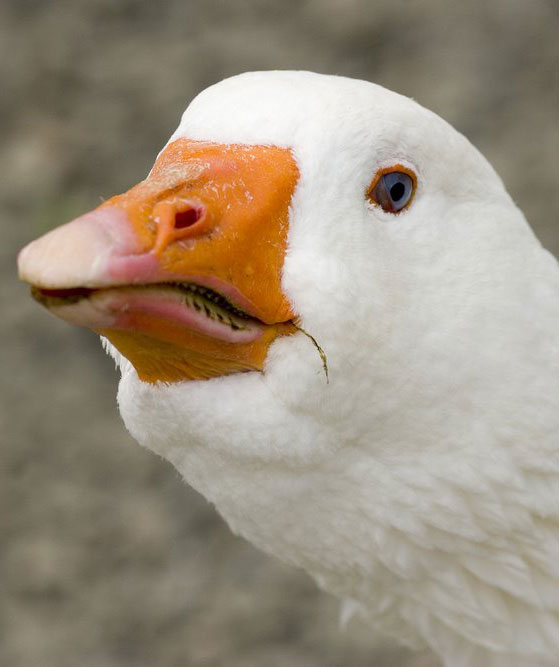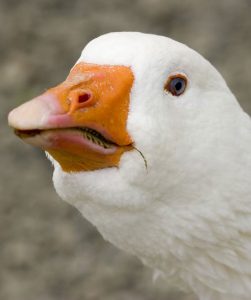
Geese can get pretty aggressive. The behavior relates to the fact that they are large, clumsy birds. They can’t easily hide when threatened, so they resort to aggression to ward off danger.
The best way to avoid aggression aimed in your direction is to take time to greet your geese whenever you enter their yard. Notice how they gabble and posture while greeting one another; it’s the polite thing to do. It’s the goose equivalent of humans shaking hands.
Another way to minimize aggression is to avoid big, sudden, or loud movements while you are tending your geese. Also ensure that dogs, children, and all others are taught to move quietly among your geese and to never, ever tease them.
A gander gets especially aggressive during breeding season, when he will fiercely defend his mate while she’s on the nest, and later with the same fierceness defend his offspring. When a gander is thinking about attacking, he will stretch his neck full length, throw his head back, and peer at you with one eye. This posture indicates he isn’t too sure about the wisdom of attacking. If you move toward him waving your arms and making a loud noise, he’ll likely back off.
The time to beware is when an annoyed goose makes a beeline toward you with his neck stretched forward, head down, making hissing sounds. This gander plans to bite, but the worst thing you can do is run away. You need to show him who’s boss, but that doesn’t mean giving him a swift kick with your boot or otherwise engaging in a tussle. Fighting with a gander will only make him meaner.
When a gander comes at you with the intent to bite, clap your hands and stamp your feet. If he keeps coming, swing your arms to make yourself look as big as possible, and run toward him. If that doesn’t work, extend your arm with a pointed finger (creating the appearance of a long goose neck with a beak at the end), and move menacingly toward him. Tell him firmly, “Don’t you dare!”
If he gets close enough to bite, give him a sharp smack on top of the bill. With a young gander, only one or two smacks should be enough to let him know which of you is the bigger, meaner gander. Once you’ve made your point, you shouldn’t need to repeat it in the future. Smacking may seem heartless, but it does not injure the goose and it sure beats getting attacked by a big angry bird.
And let me tell you, this is no laughing matter! A goose has a sharp toothlike tip on its upper bill. When it takes a pinch of your skin, twists its head, and pulls back, the result is torn flesh surrounded by a bruise. And that’s not the least of it. As the goose pulls away, it is likely to give you a couple of good whacks with one or both wings. Getting hit by the wing’s bony edge feels like being beaten with a billy club, causing multiple bruises on your person.
So, take heed: If a smack on the bill doesn’t serve as sufficient deterrent, step to one side as the gander rushes at you, grasp him by the back of neck, and turn him away. If he struggles to turn back toward you, lift him off the ground, keeping clear of his flailing wings. This action does not harm to the gander, but does cause him to suffer a great indignity he is not eager to repeat.
As young geese are growing, if you offer polite greetings, and nip aggression in the bud at the first sign, your geese can learn to be docile and fun to be around.
And that’s today’s news from the Cackle Coop.
Gail Damerow is editor and principal author of Backyard Homestead Guide to Raising Farm Animals, which includes a chapter on raising geese and ducks.



I recently added a very young pair of Ebdons to my flocks of 9 large ducks and 6 chickens. The gander when able takes delight in grabbing either. Its obviously quite painful for the duck of chicken, Who can only escape b the time I get there by leaving a beak full of feathers behind. It’s only been a few weeks. I don’t have a huge garden.. I’m hoping this behaviour will die down – but dreading next springs breeding season.
My male goose will not leave me alone he will literally climb on top of me and constantly nip at my head and ears I have tried EVERYTHING including what I just read from this here thread and NOTHING works, I will move and sit somewhere else and he will follow me EVERY TIME ?
How do you greet geese? Especially when they are in large groups?
I would get down at eye level with them and make conversation. They will greet you with hissing and honking while lowering their head. As long as you don’t get scared with this behavior from the time they’re young this will be the way you’ll greet each other.
Hi Claudia & Leanne
We have 3 Embden geese, 2 females & one male. Our eldest female is 2 months old and the two youngest are from the same brood and are one month old.
They too get extremely excited and nippy sometimes, as they get bigger the nips were getting stronger so we needed to put a stop to it. It was never aggressive behaviour, they are good, friendly birds, they would just get extremely excited, especially at bedtime when we would tuck them into their coop at night & my daughters would give them cuddles.
Embdens are EXTREMELY intelligent birds, we have ours well trained, they come when they are called like dogs. So I just started saying “NO” very firmly when they got nippy and pushing down gently and firmly on their bills. If the behaviour continued past 3 “no’s” they were put down off our laps and given a “timeout” 🙂 Trust me, they listen now when we say no. Those geese are like babies, they love their hugs and snacks!
Try it and see how it goes!
Our female goose tends to bite we think when she is very happy/excited or overstimulated. She tends to do it when we give her fresh water, food or when she wants picking up for a cuddle. There’s a lot of contented squeak-like noises when she does it, rather than honking per-say.
Can’t seem to find any info on this kind of good behaviour.
Has anyone else experienced a similar behaviour?
I’m currently researching this too. Our Gosling is 2 weeks old and nips us in a playful way but I can see her nips are going to get stronger as she gets bigger. How do we stop it.
Also she charges at my 2 year old with her head down and attempts to peck at him. Does my 2 year old need to stand his ground and make himself look bigger or will it work if someone else tells her off? Shes absolutely lovely with me older 2 boys and let’s them pick her up for cuddles etc. My 2 year old hasn’t really cuddled her much. Is this why shes charging at him? It only started today and it crossed my mind that she could be jealous that my 2 year old was getting cuddled alot today. Do they get jealous? What do I do to nip this in the bud? Thank you
I made by daughter’s goose upset, now she doesn’t like me or my daughter. What can I do to fix this. We have different colored hair but sound alike and look alike. I feel really bad ?
…how long, on average, is a gander highly protective of goslings? I have 6 goslings that have hatched and they are approximately 2 weeks old now. The gander has been the leader with mamma and babies following in toe, but he keeps leading them to places they should not go/haven’t been and are unfamiliar with. I understand and love that he is such a great Dad, but, he is driving me nuts. Will and when should he calm down? Also, when is it best to ‘rehome’ some of the goslings? I’m worried that if it’s too soon the geese family will honk like mad, because they know exactly how many goslings and where they are constantly….
All you need to do to deter an attacking goose is to firmly and gently hold it by the neck near the head and push it away. This does the trick quicker than anything else without too much fuss.